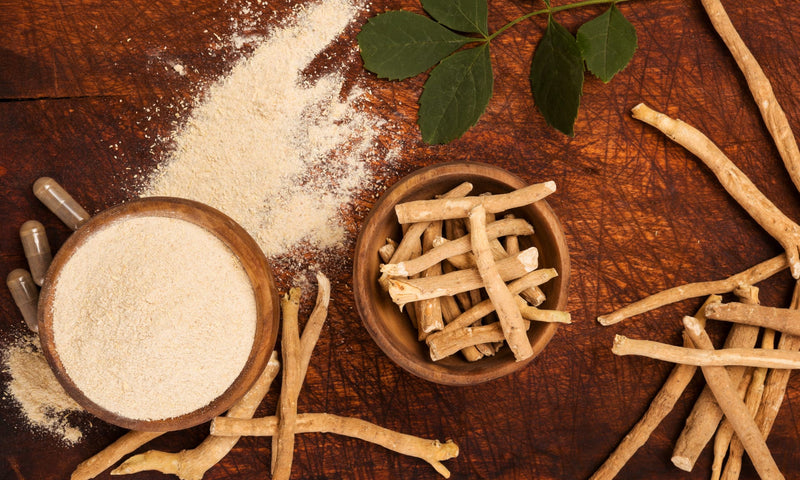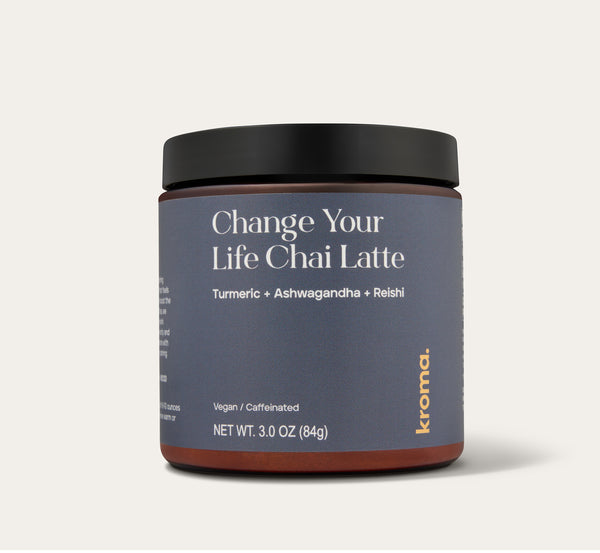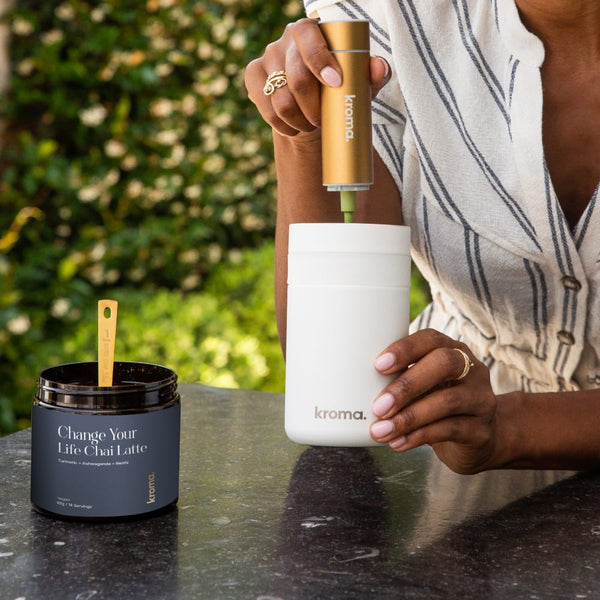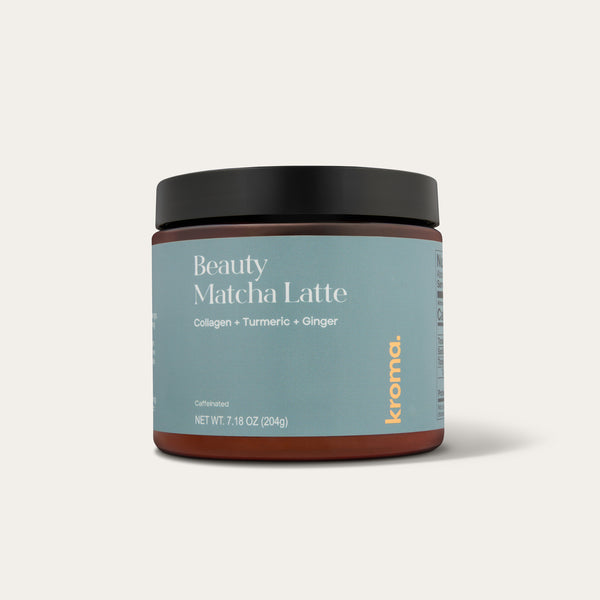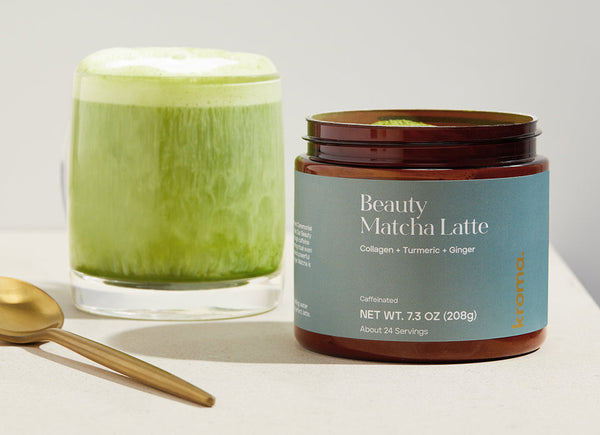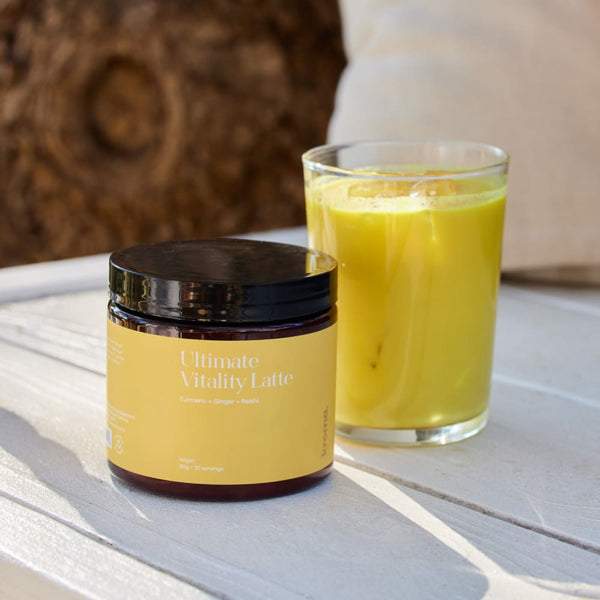Is there anything a woman can’t do? Not only do our bodies go through many changes throughout our lives, leaving us to navigate the new normal, but we basically run the world, or at least our own world.
With the many hats we wear, from a tenacious professional, loving spouse, kisser of booboos, chauffeur of the family, chef of the house, supportive friend, and, at times, the life of the party, we need an extra boost to support us and our health.
Ashwagandha can be that boost we need.
What Is Ashwagandha?
Ashwagandha (scientific name Withania somnifera) is an herb native to India and Southeast Asia. This herb is also known as Indian ginseng or winter cherry. Translated to “smell of the horse,” it is thought to be referencing the strong horse-like smell of the herb, and also the strength and vitality it provides.
This herb has been used for thousands of years to reduce stress, increase energy, reduce inflammation, support mental health, and promote overall well-being.
Ashwagandha is a small evergreen shrub with yellow-green leaves. It has small greenish flowers that look like little bells and red berries grow within them. The flower makes a husk around the berry, much like a gooseberry. The roots of this plant are tubular in shape, similar to a carrot.
The ashwagandha leaves are generally topically, typically to cleanse and moisturize the skin. They can also be made into a cream to heal cuts, skin infections, and bruises. Sometimes leaves are used to make teas or mixed with roots in supplements.
The roots are generally what you will find in an ashwagandha supplement. Supplements with only roots, without leaves, are thought to be the most pure. Once harvested, the roots are left to dry. After they are dried completely, they are processed into a powder and sold as that powder or in a capsule.
The ashwagandha berries are generally not eaten, although some cultures do consume these very bitter berries. While not often used for medicinal purposes in the form of supplements or teas, the berries can be used as a substitute for rennet in making cheese.

Where Did Ashwagandha Originate?
Ashwagandha has been used in Ayurvedic medicine since 6000 BC. Ayurvedic medicine is an ancient Indian medical system with the belief that there is a delicate balance between the mind, body, and spirit, which is crucial for health and well-being. Ayurveda is still used around the world, and to this day continues to be a legitimate medical system in India.
In Ayurveda, ashwagandha has been thought of as the most prominent Rasayana herb. Rasayana is translated to mean “path of essence” and is described as an herbal preparation that promotes rejuvenation and youthfulness of mental and physical health. It was often given to children, the middle-aged, and elderly people as a tonic to promote longevity.
In Ayurvedic medicine and modern medicine alike, ashwagandha is also considered an adaptogenic herb. This special type of herb is used to help the body reduce stressors. These stressors can be physical, chemical, hormonal, or biological. Ashwagandha helps support the stress response and may help regulate hormones. With its antioxidant properties, it can help protect against the negative effects of stress on the body.
What Are the Benefits of Ashwagandha for Women?
Ashwagandha has been proven time and time again to be a powerful herb when it comes to relieving stress and supporting the immune system, brain health, and overall vitality. But what are the benefits of ashwagandha for women specifically?
Women go through many changes during life and have many responsibilities on their shoulders. Perhaps ashwagandha may be what we need to help support women’s overall health, support our changing bodies, and provide anti-aging remedies.
Here are ways ashwagandha benefits women specifically:
1. Ashwagandha Root Helps Improve Sexual Dysfunction
Many women experience sexual dysfunction at some point in their lives, although it is hard to know just how many since most people, not just women, are hesitant to bring this concern up to their medical providers.
Sexual dysfunction can include one or more of the following symptoms:
- Low desire (low libido)
- Sexual arousal disorder
- Low orgasmic desire
- Pain during or after sex
There are many causes for sexual dysfunction — some are physical, hormonal, psychological, or a combination of these.
When it comes to physical reasons, pre-existing medical conditions can be to blame, as well as some medications, like those for depression or regulating blood pressure. There can also be a hormonal imbalance, like low estrogen. Women can experience low estrogen many times in life, specifically during menopause, after childbirth, or during breastfeeding. Psychological issues can be at play, as well. Mental health issues and long-term stress can add to sexual dysfunction.
One ashwagandha root benefit is that it is thought to have been used for thousands of years to improve sexual dysfunction. This powerful herb is still used today. Now, studies are backing up the anecdotal evidence, and show that ashwagandha has improved satisfaction, ability to have an orgasm, lubrication, and desire.
Kroma’s libido-boosting Spicy Passion Latte is the hot chocolate equivalent of the Kama Sutra, combining ashwagandha with cacao, cinnamon, mesquite, cayenne pepper and medicinal mushrooms to promote sex drive, energy, and mood.

2. Helps Manage Stress
Women wear a lot of hats. We are mothers, wives, daughters, sisters, friends, and professionals, and we have all of the responsibilities that come with each of these. While it is a joy to be a woman, stress is unavoidable. Our lives have never been busier, and now add on a global pandemic — it can feel so heavy at times.
When we are stressed, we release a hormone called cortisol. Cortisol is imperative for “fight or flight” moments, as it increases glucose (our main energy source) in the bloodstream and brain, and it shuts down what it considers to be nonessential functions to get out of harm's way.
What should happen in a stressful situation is: the body releases cortisol, we get out of the stressful event, and the cortisol levels go down. If you are constantly feeling stress, however, cortisol levels will stay high to try and combat that stress, and that can lead to chronic stress and anxiety.
This is where ashwagandha comes in. This adaptogenic herb can help decrease cortisol in the blood, helping you to get out of a constant “fight or flight” feeling. This can help to reduce feelings of chronic stress, restlessness, and emotional discomfort.
3. Helps Prevent Grey Hair
“You're going to give me gray hair!” We've all heard our parents say it, and, if you have a child, you've probably said it (or at least thought it) a few times.
However, does this common idiom have any truth? As it turns out, researchers have looked into this, and yes, stress can cause our beautiful locks to turn gray.
Stem cells in the hair follicle are what hold the pigment for hair color. Stress can cause the release of norepinephrine, which makes the stem cells activate excessively, sending them out faster than usual to the hair follicle and out into the skin. Unfortunately, there are a set amount of stem cells in the hair follicle. If there are no stem cells with pigment to color the hair, you are left with gray.
Age is the main reason we go gray. As we age, less pigment is created, and, like in the stress scenario, there are fewer and fewer stem cells in the follicles as we age.
So, what is a woman to do if she wants to slow the gray hairs that start popping out? You could try adding ashwagandha to your daily routine. As we have learned, ashwagandha protects the body from stress, which will also provide protection to the hair follicles. Ashwagandha is also high in antioxidant properties that may slow the aging process.
4. Helps Boost Immunity
Ashwagandha has been shown to help with cell-mediated immunity. There are two types of immunity, humoral and cell-mediated. Humoral immunity uses antibodies to fight and neutralize foreign material that is extracellular, or outside the cell. Cell-mediated immunity does not rely on antibodies and instead uses mature T-cells. These T-cells go after and kill the cell that has been compromised by a virus, bacteria, or fungi.
Ashwagandha is also an antioxidant, which plays a large role in the overall health of the body. Antioxidants protect against free radicals and oxidative stress. Free radicals are oxygen molecules with unpaired electrons. These electrons need to be paired, so the molecules look for another molecule to attach to, causing oxidative stress.
While free radicals are a natural byproduct of some bodily functions, like digestion and immune defense, they can also be caused by things like stress, smoking, pollutants, and overly processed or sugary foods.
When the proportion of antioxidants and free radicals gets off balance, it may cause negative effects on heart health, mental health, and eye health, and can cause inflammation.
Consuming foods with antioxidant properties, like ashwagandha, can help reduce oxidative stress and promote overall health.
5. Helps Improve Muscle Mass
If you are looking to get stronger, you may want to look at ashwagandha. Everyone has a different level of muscle they want. Some want to just be strong enough to feel good doing everyday tasks, without being worn out or in pain. Others may want to add a little muscle mass to get back some curves they have been missing. There is also the other side of the spectrum that may want to be very defined and visibly strong. All of these are amazing reasons to get fit.
This benefit of the ashwagandha root goes further than just being strong; strength training can also help improve metabolic, sleep, mental, bone, and joint health. These are all great reasons to add a little strength training into your workout routine.
On top of working out, it has been shown that ashwagandha can provide a significant increase in muscle mass and strength.

6. Helps Relieve Hot Flashes
Many women experience hot flashes during menopause. Hot flashes are actually the most common sign of menopause.
Hot flashes are sudden feelings of intense heat on your chest, neck, and face. It may even be accompanied by redness and sweating. Hot flashes usually last between one and five minutes.
While the exact reason why the body experiences hot flashes is still unknown, most research points to decreasing estrogen levels. When these levels decrease the hypothalamus (the body’s thermostat) is incredibly sensitive to any slight change in body temperature. To cool down, the hypothalamus sends out a hot flash. After the hot flash is over, you may experience a feeling of coolness.
Both scientifically and anecdotally, Ashwagandha has been shown to reduce the symptoms of hot flashes and other symptoms of menopause, such as headaches, irritability, depression, mood swings, and sleep issues.
7. Helps Improve Memory
Women generally have better memory than men, but there are some life events that can negatively affect our memory. Have you ever heard of or experienced “mommy brain?”
Many women can experience brain fog and forgetfulness after giving birth and it can last for a few months. Women can also experience memory issues during menopause because of the lowering of estrogen levels. Stress, anxiety, and depression can also cause temporary memory issues. Women are also more at risk for age-related memory loss.
While it seems like a double-edged sword that women generally have better memories but have more moments of memory issues, there are things you can do to support your memory.
Ashwagandha is a great way to support your brain and memory. It has been shown to support both immediate and general memory. Ashwagandha also supports better mental health, which can help improve memory. The antioxidant properties of this powerful herb also protect the brain against free radicals, help reduce brain fog, enhance cognitive function, and improve memory.
How Long Does Ashwagandha Take To Work?
Ashwagandha is an herb that is generally sold as a supplement or added to packaged teas. There are also different amounts of ashwagandha per serving, and there are different qualities. That being said, there are many factors that play into how long ashwagandha takes to work.
If you take a high dose of ashwagandha, say near 6,000 mg per day, the benefits of taking a smaller dose at 1,250 mg will likely become apparent. The problem with taking high doses is you may experience negative side effects such as drowsiness, headaches, and upset stomach. While you may get a benefit from the higher dose like temporarily relieving hot flashes, it may not be worth the intense adverse reaction.
How fast ashwagandha works for you may also depend on how long you’ve had your symptoms, and how severe your symptoms are. If you’ve been struggling with feelings of restlessness and you’re always on edge (and you’ve been like this for many years) it may take two weeks or more to see a significant change.
However, if you are in the middle of a stressful situation like deadline week at work, and you look to ashwagandha to help support your body through the stress, you may see the benefits within days.
What Are The Side Effects of Ashwagandha on Females?
We now know the many ashwagandha root benefits, but are there any side effects we need to consider?
As with most supplements, ashwagandha should be used with caution; in large doses people may encounter:
- Diarrhea
- Upset stomach
- And vomiting
In rare cases, liver problems may occur.
For most, the benefits of ashwagandha in women outweigh the potential side effects, but each person should consider these things for themselves and make informed decisions about the supplements they take.
How Can I Incorporate Ashwagandha Into My Diet?
The most common way to incorporate ashwagandha into your diet is through a capsule or loose powder. Look for powders or capsules that use only the root. While the leaves do have their benefits, 100% ashwagandha root is the best quality. Ashwagandha powder assimilates best with the body and can be added to smoothies, hot beverages, and baked into desserts. It adds a nutty, bitter-sweet taste.
The easiest way to add ashwagandha to your diet? Drink the Change Your Life Chai Latte from Kroma Wellness. Not only does this tea have the calming benefits of ashwagandha, but it also has soothing chai spices and vanilla to hug you from within. We’ve also added turmeric, cordyceps, and reishi mushrooms to give an extra boost of immunity and antioxidants.

How Much Ashwagandha Should I Have Per Day?
While there is no set rule on how much ashwagandha you should take per day, 1,000 to 6,000 mg per day is a general range. You may want to start out with a smaller dose and gradually increase until you find what works best for you.
Starting slow may also help minimize any adverse reactions you may have, like headache, drowsiness, or upset stomach. Generally, these are only experienced with very high consumption, but everyone’s body reacts differently.
Is Ashwagandha Right For Everyone?
There is no one size fits all supplement, and ashwagandha is no exception. While ashwagandha is considered safe for most people, if you have any questions, you should always consult with your doctor.
Anyone who has issues with thyroid health or autoimmune immune disease should always talk to their doctor before adding ashwagandha to their daily supplements.
While there is anecdotal evidence that ashwagandha may help support breastfeeding women through the stress of the newborn stage, at this time no scientific research has been done to prove or disprove these claims. Women who are pregnant or breastfeeding should consult their doctor before using.
The Bottom Line
Ashwagandha is an Ayurvedic, adaptogenic herb that has been used for thousands of years for energy and vitality.
As a woman, if you are looking for a way to help balance stress, sexual dysfunction, aging, immunity, and hormonal changes, ashwagandha may be just the herb you need to add to your daily routine.
At Kroma, we love supporting women by providing functional superfood nutrition in a deliciously convenient way. You can get started with our ashwagandha-enhanced Change Your Life Chai and Spicy Passion Latte, or if you’re ready to see how much better you can feel by incorporating superfood into your everyday routine, you can explore our 5-Day Reset here.
An Overview on Ashwagandha: A Rasayana (Rejuvenator) of Ayurveda | NCBI
Female sexual dysfunction - Symptoms and causes | Mayo Clinic
Chronic stress puts your health at risk | Mayo Clinic
Ashwagandha for reduced stress and anxiety | Pharmacy Today
New findings suggest how stress may trigger gray hair | Harvard Gazette
T Cell-Mediated Immunity - Immunobiology | NCBI Bookshelf



